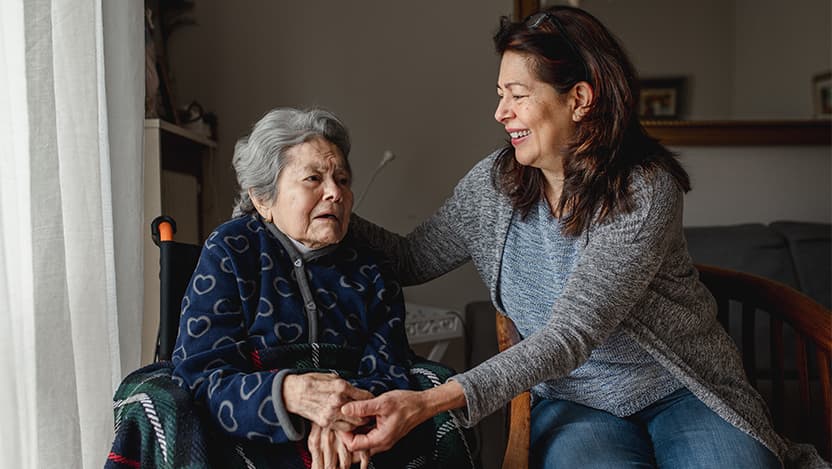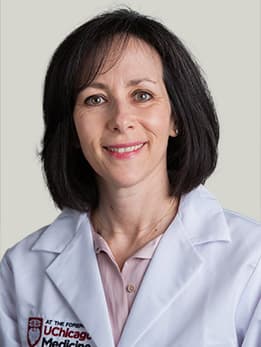Caregivers have it tough — and the COVID-19 pandemic made things worse

When Floria Foote became a caregiver for her elder sister, she didn’t anticipate how much work she would eventually take on during her sister’s decline.
“It was so not like her,” said Foote. “She was the go-getter, raising two adoptive kids and taking care of our aging father at the same time. She went from that level of activity to not wanting to do anything. I had to help her wash up in the morning, keep her on a schedule, manage her bills, everything.”
Foote’s experience as a caregiver is surprisingly common. One in five U.S. adults provided unpaid care for another adult in 2020. This invisible group provides essential support to our society, particularly as the population ages, but faces numerous challenges and a dearth of resources in the course of their work. New research at the University of Chicago Medicine underscores the issue.
A new study finds that, before the COVID-19 pandemic, women caregivers had significantly higher odds of experiencing health-related socioeconomic vulnerabilities such as food insecurity, financial strain and transportation difficulties compared to non-caregivers, with 63% of caregivers reporting at least one vulnerability compared to 47% of non-caregivers.
During the early days of the COVID-19 pandemic, their plights worsened — caregivers had higher odds of experiencing new or worsening financial strain, as well as new interpersonal violence, food insecurity, transportation difficulties and housing insecurity. The results were published September 26 in the Stacy Tessler Lindau, MD, MA, Professor of Obstetrics and Gynecology and Medicine-Geriatrics at UChicago Medicine. “When I identify and appreciate my patients as whole people, including their role as caregivers, I can adjust my medical recommendations around that reality.
"If I don't, my best medical care may be futile. This study is a call to action for healthcare systems to systematically and proactively identify people who are caregivers so we can provide care that works for them in the context of the critically important care they give to others," Lindau said. "Caregivers are an overlooked extension of our healthcare system.”
The researchers stress that while caregivers face additional challenges, these challenges are modifiable. “Something can be done to support caregivers,” said Makelarski. “Things got worse for everyone during the pandemic, but even more so for women caregivers. And these are things that we can work toward intervening on, to better support this essential component of our healthcare system.”
They hope that these results will help further efforts by the federal government to formalize support resources for caregivers. They also plan to share the results with community organizations and representatives who can raise awareness on this issue and advocate for systemic change.
“Traditionally, medical care has been primarily focused on what happens within the boundaries of the body and the four walls of a clinic or hospital,” said Lindau. “But there are drivers outside the walls, such as access to food and transportation and a safe community, which affect a person’s health.
"How can women caregivers provide care for their loved ones if they don’t have enough food to eat themselves, or are subject to violence in their home or community? Women caregivers are bridging the great big gap between the healthcare system and home for our rapidly aging population and it's in all of our best interests to support them.”
For Foote, whose sister passed in 2020, being able to support her sister was exhausting, but she was grateful for the opportunity to be there. “I always said that if she needed me, I would come help take care of her,” said Foote. “The COVID-19 pandemic made everything a lot more work, but it was nice to be living with my sister again, to be there for the day to day.”
The study, “Caregiving in a Pandemic: Health-Related Socioeconomic Vulnerabilities Among Women Caregivers Early in the COVID-19 Pandemic,” was supported by the NIH (5R01AG064949, 5R01MD012630, R21CA226726 and 1R01DK127961. Additional authors include Kelly Boyd and Victoria Winslow, MPH, of the University of Chicago Medicine and Soo Borson, MD, of the University of Southern California.
“It was so not like her,” said Foote. “She was the go-getter, raising two adoptive kids and taking care of our aging father at the same time. She went from that level of activity to not wanting to do anything. I had to help her wash up in the morning, keep her on a schedule, manage her bills, everything.”
Foote’s experience as a caregiver is surprisingly common. One in five U.S. adults provided unpaid care for another adult in 2020. This invisible group provides essential support to our society, particularly as the population ages, but faces numerous challenges and a dearth of resources in the course of their work. New research at the University of Chicago Medicine underscores the issue.
A new study finds that, before the COVID-19 pandemic, women caregivers had significantly higher odds of experiencing health-related socioeconomic vulnerabilities such as food insecurity, financial strain and transportation difficulties compared to non-caregivers, with 63% of caregivers reporting at least one vulnerability compared to 47% of non-caregivers.
During the early days of the COVID-19 pandemic, their plights worsened — caregivers had higher odds of experiencing new or worsening financial strain, as well as new interpersonal violence, food insecurity, transportation difficulties and housing insecurity. The results were published September 26 in the Stacy Tessler Lindau, MD, MA, Professor of Obstetrics and Gynecology and Medicine-Geriatrics at UChicago Medicine. “When I identify and appreciate my patients as whole people, including their role as caregivers, I can adjust my medical recommendations around that reality.
"If I don't, my best medical care may be futile. This study is a call to action for healthcare systems to systematically and proactively identify people who are caregivers so we can provide care that works for them in the context of the critically important care they give to others," Lindau said. "Caregivers are an overlooked extension of our healthcare system.”
The researchers stress that while caregivers face additional challenges, these challenges are modifiable. “Something can be done to support caregivers,” said Makelarski. “Things got worse for everyone during the pandemic, but even more so for women caregivers. And these are things that we can work toward intervening on, to better support this essential component of our healthcare system.”
They hope that these results will help further efforts by the federal government to formalize support resources for caregivers. They also plan to share the results with community organizations and representatives who can raise awareness on this issue and advocate for systemic change.
“Traditionally, medical care has been primarily focused on what happens within the boundaries of the body and the four walls of a clinic or hospital,” said Lindau. “But there are drivers outside the walls, such as access to food and transportation and a safe community, which affect a person’s health.
"How can women caregivers provide care for their loved ones if they don’t have enough food to eat themselves, or are subject to violence in their home or community? Women caregivers are bridging the great big gap between the healthcare system and home for our rapidly aging population and it's in all of our best interests to support them.”
For Foote, whose sister passed in 2020, being able to support her sister was exhausting, but she was grateful for the opportunity to be there. “I always said that if she needed me, I would come help take care of her,” said Foote. “The COVID-19 pandemic made everything a lot more work, but it was nice to be living with my sister again, to be there for the day to day.”
The study, “Caregiving in a Pandemic: Health-Related Socioeconomic Vulnerabilities Among Women Caregivers Early in the COVID-19 Pandemic,” was supported by the NIH (5R01AG064949, 5R01MD012630, R21CA226726 and 1R01DK127961. Additional authors include Kelly Boyd and Victoria Winslow, MPH, of the University of Chicago Medicine and Soo Borson, MD, of the University of Southern California.

Stacy Tessler Lindau, MD, MA
Stacy Tessler Lindau, MD, MA, focuses on patient care, research, education and advocacy related to the health of aging women and urban populations. Dr. Lindau is the director of the Program in Integrative Sexual Medicine (PRISM), a program that provides care for and studies female sexual function in the context of aging and common illnesses.
Learn more about Dr. Lindau